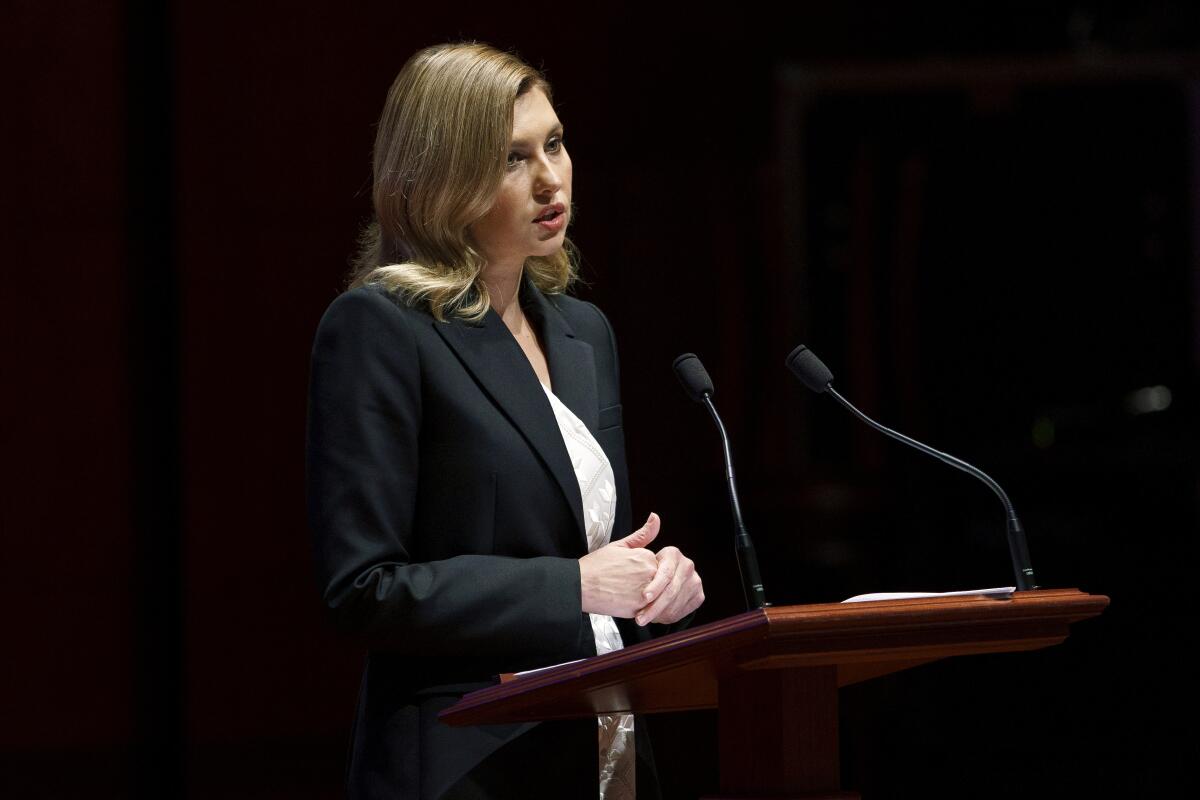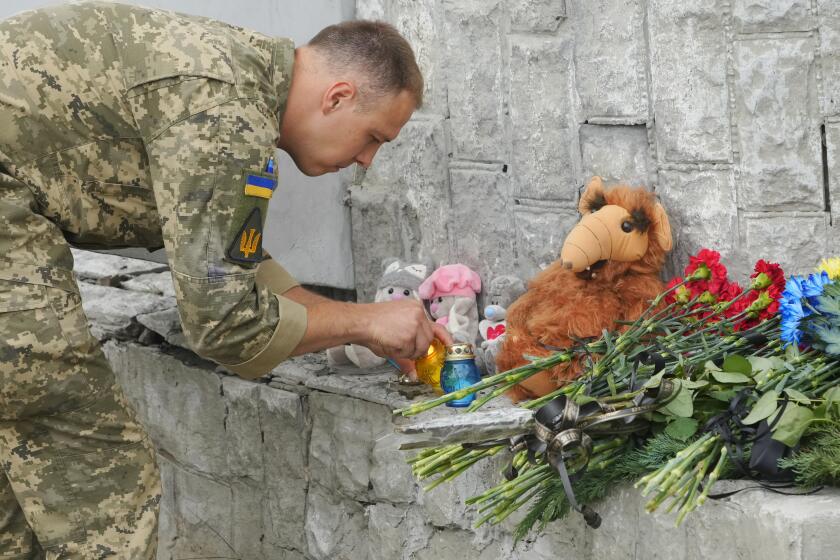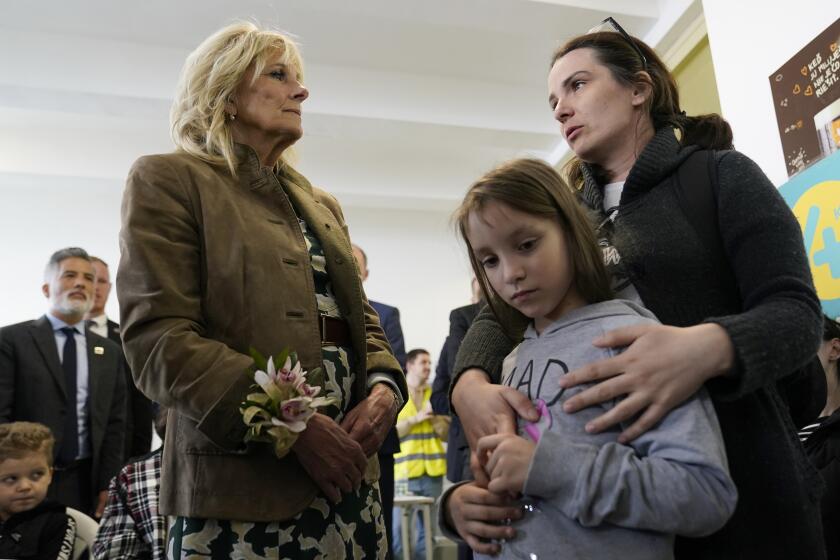Taking spotlight, Ukraine’s first lady pleads for more U.S. arms

- Share via
WASHINGTON — Ukrainian first lady Olena Zelenska long has made clear she has no personal craving for the spotlight. Yet on Wednesday, she stood in the U.S. Capitol and made the case for more U.S. air defense systems to block Russian missiles.
She showed America’s most powerful lawmakers stark images of the toll of Russian bombardment of cities on Ukraine’s children — a blood-splattered baby stroller, a small crumpled body.
For Zelenska, spouse of President Volodymyr Zelensky, the appearance capped a week in Washington that marked some of her highest-profile appearances of the five-month war. The visit was also one of the first times most Americans have laid eyes on her.
“We want no more airstrikes. No more missile strikes,” Zelenska told the American lawmakers on Wednesday, as an overhead screen displayed some of the war’s youngest victims. “Is this too much to ask for?”
Zelenska, speaking to an audience that included House Speaker Nancy Pelosi (D-San Francisco) and Senate Minority Leader Mitch McConnell (R-Ky.), appeared in the same congressional auditorium where her husband drew standing ovations from lawmakers three weeks into Russia’s invasion. The Ukrainian president had spoken by video.
Zelensky has won praise from supporters for staying in Kyiv since Russia attacked, speaking nightly by video address. Zelenska and the couple’s two children, meanwhile, went into hiding away from Zelensky for security reasons over the first two months of the war.
A 4-year-old girl with Down syndrome was walking to a speech therapist with her mother in central Ukraine when she was killed by a Russian missile.
Zelenska worked as a scriptwriter for her husband, a comedian and actor before he won the presidency in 2019. They married in 2003.
Speaking to Vogue magazine the same year her husband was elected, Zelenska said that she herself was no teller of jokes, and “a non-public person.”
But as first lady, “I found for myself arguments in favor of publicity. One of them is the opportunity to draw people’s attention to important social issues,” Zelenska said then.
A visit by Jill Biden to western Ukraine in May, when the two first ladies spoke privately and sat alongside displaced children living at a school, marked the start of Zelenska’s emergence from her wartime seclusion. Ukrainian officials said it was Jill Biden who invited Zelenska to come to Washington.
The Ukrainian first lady in Washington has spoken — largely away from reporters — with Jill Biden, Secretary of State Antony J. Blinken, U.S. Agency for International Development Administrator Samantha Power and others.
As many as 60 people are feared dead at a school in Ukraine. Zelensky compares the fight against Russia to World War II battle against Nazi Germany.
She received a blue and yellow bouquet of sunflowers and hydrangeas from President Biden on arrival at the White House for her meeting with the U.S. first lady.
Until Wednesday’s appearance before lawmakers, accounts of Zelenska’s conversations with U.S. officials this week focused on the need for mental health care for Ukrainians dealing with the trauma of the war, and a U.S. offer of rehabilitation assistance for children who’ve lost limbs in the war — humanitarian causes, not strategic or tactical.
But Zelenska also noted in a tweet she had talked with Vice President Kamala Harris’ husband, Doug Emhoff, at the White House on Tuesday on how “to turn the ‘soft’ power of the first spouses into a powerful and effective tool.”
Her blunt description to lawmakers of the deaths of children turned that soft power into a blunt and forceful instrument.
She showed photographs of a smiling, paint-smeared 4-year-old girl, Liza Dmytrieva, whom the first lady had happened to meet before Christmas.
The screen next showed an overturned baby carriage with blood caking on the sidewalk beneath it, after an airstrike killed the girl and badly injured her mother last week.
“Our family represents the whole world for us, and we do everything to preserve it,” Zelenska said. “We cry when we cannot save it. And we remain completely broken when our world is destroyed by war.”
Another photo showed a girl in a pink headband, shot by Russian soldiers with her family as they tried to flee, and who screamed and cried for two hours in their car before dying herself, Zelenska said.
Another showed three generations — grandmother, mother, baby daughter — killed by a Russian airstrike in the port city of Odesa, Zelenska told lawmakers. Yet another showed a 3-year-old boy, learning how to use a prosthetic limb after another airstrike.
Zelenska also noted Wednesday the humanitarian needs of the war. “Maybe you expected from me to speak on those topics,” she told lawmakers, through an interpreter. “But how can I talk on all that when an unprovoked war is being waged on our country?”
Lawmakers and others gave her a standing ovation before her speech. Then the photos on the screen had some shaking their heads at the scenes. The unsparing account and her direct appeal to lawmakers for more arms, especially more air-defense systems, echoed her husband’s calls throughout the war for more weapons from the U.S. and other allies.
The daily reminders to the U.S. for more support have been effective, but as the war grinds on it could risk resentment from government leaders, who as of the start of June have committed $4.6 billion in security assistance for Ukraine.
“We’ve seen from Ukrainian leadership their courage but also their no-nonsense direct appeal and laying out the brutal mentality of Mr. Putin,” Sen. Benjamin L. Cardin, a Maryland Democrat, said as lawmakers walked out.
Pelosi spoke before Zelenska’s address, describing U.S. lawmakers as “strong supporters of the Ukrainian people and admirers” of Zelensky’s and Zelenska’s leadership.
In his nightly video address in Ukraine on the event of his wife’s speech, Zelensky said she would be speaking to U.S. lawmakers “on behalf of all Ukrainian mothers, all Ukrainian women, and it will be an important address.”
In Kyiv this week, some Ukrainians said they had been following her U.S. visit.
“I treat her with great respect,” said one, Larysa Logvinova, 63, adding, “Oh, I’m going to cry now.”
“She’s the best,” Logvinova said. “She is fragile, intelligent, and says the right things. As for her visit to the USA, I am very positive about it. And I hope that the result of her mission will be that Ukraine will receive additional aid.”
Knickmeyer reported from Washington and Arhirova reported from Kyiv.
More to Read
Sign up for Essential California
The most important California stories and recommendations in your inbox every morning.
You may occasionally receive promotional content from the Los Angeles Times.












